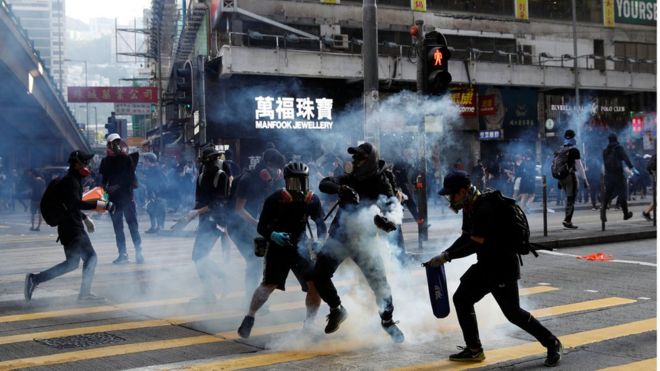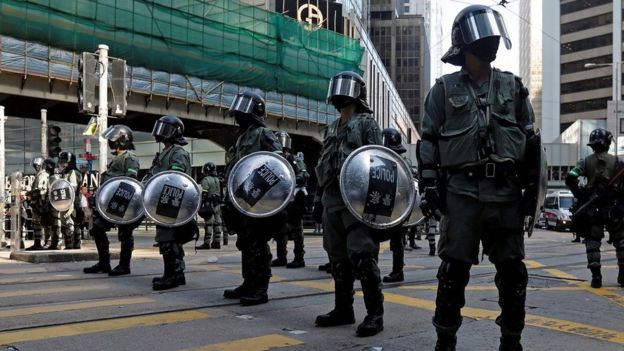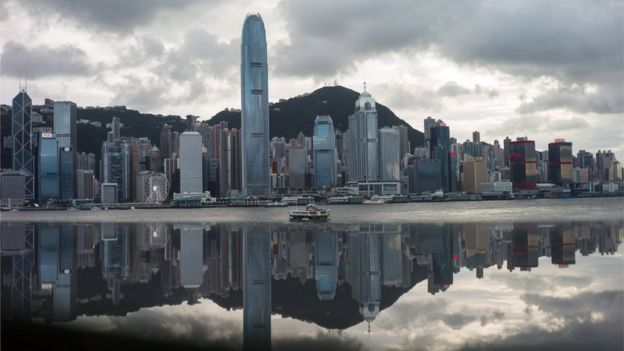Hong Kongers Awaiting American Intervention
"The United States should continue to deter Beijing from use of force, maintain an unblinking eye on Hong Kong, and make Beijing pay a heavy reputational cost for curtailing the rights and freedoms of Hong Kong citizens."
"I worry that the protesters in Hong Kong risk misinterpreting American sympathy and support of their cause for expectation that the United States will shield them from Beijing's heavy hand."
Ryan Hass, former U.S. State Department official
"We're telling everyone that we interact with, we don't want violence."
"We think there should be a political solution to the conflict that's taking place there."
U.S. Secretary of State Mike Pompeo
"The power of Hong Kong people alone is limited, and we need other countries, such as the United States to help us counter China and keep 'one country, two systems'."
"I doubt the act can be an ultimate game-changer, but I think it is enough to give pressure to China."
Eric Kwan, 32, Hong Kong
 |
| The protests have raged for months - but now expat workers are looking to leave the financial hub Reuters |
The financial power house that Hong Kong represents is quickly dialing down its functioning bureaucracy, its municipal services hit as hard as its banking interests, as the peaceful protests of months-long duration have turned inevitably to wild riots. Chinese expatriates around the world face off against one another, forming groups from mainland China and Hong Kong, their loyalties toward or against the Chinese Communist Party creating toxic group dynamics, reflecting their support for the government or the protests, echoing the Hong Kong gatherings defying government orders.
The Hong Kong riot police may have their tear gas and rubber bullets but the protesters have their bricks and incendiary devices to lob at the police. The stability of Hong Kong, so recently an economic power house respected world wide, and bringing in massive foreign investment, is leaking prestige on the international stage with wary business interests beginning to withhold their investments awaiting a return to a secure business environment, but in the meantime, Singapore has been the recipient of new enterprising opportunities.
Protesters have convinced themselves that somehow the United States is preparing to ride to their rescue, to somehow convince President Xi Jinping to pull back and surrender to the reality that Chinese mainland control of Hong Kong betrays an agreement to allow the autonomous state its continuing status as a separate governing and financial model within greater China. Beijing has definitely not been impressed by the unstoppable protests, the determination of the protesters, the damage being done to its international reputation.
The indomitable demands of Beijing that Hong Kong retain a guaranteed return to controlling its own immediate affairs while the Communist Party stands back and in effect admits defeat at the hands of an intransigent population whose loyalties are presumed to be in the wrong place is not likely to eventuate; China cannot afford it and nor will Beijing accept the demands. The democratic rights and freedoms that the protesters demand do not reflect Beijing's ideological charter, after all.
That the U.S. Congress is moving ahead with a bill of support to the protesters with bipartisan support, has influenced the protesters in their belief of American intervention on their behalf is obvious enough, but perhaps a bit too naive. Economic sanctions could be imposed by the United States against Beijing however, along with a travel ban on officials in Hong Kong considered responsible for abuses of human rights, under the proposed legislation.
"We hope this bill will pass. It's our hope for winning this war. We're trying all we can", observed Selina Po, 27, protesting in Hong Kong, her sign reflecting the name of the U.S. bill:
The Hong Kong Human Rights and Democracy Act. This, while U.S. officials warn of a need to weigh U.S. reactions carefully with a view that involvement by the U.S. might allow more ammunition to Beijing in a propaganda ploy portraying the pro-democracy movement stoked not internally, but by dupes of foreign forces, fuelling greater violence.
 |
| Police have faced off with protesters alarmed at growing influence from Beijing Reuters |
Back in June, President Trump informed his Chinese counterpart through a telephone conversation that he planned to remain uninvolved on Hong Kong while Washington and Beijing succeeded in making progress on trade talks, according to an American official speaking anonymously, while administration officials claim this approach allows the United States a firmer hand in constraining Beijing's response to the protests. "Hong Kong is China's Hong Kong. Any attempt to interfere in Hong Kong affairs will not succeed" stated a Chinese Foreign Ministry spokesperson.
As far as the protesters are concerned, the very threat of U.S. sanctions would validate and empower the protest movement with a greater voice in negotiating with Beijing. In mid-October, the day before the House of Representatives voted to pass the bill, Hong Kong protesters rallied in the Central district where tens of thousands had gathered, many holding aloft American flags.
 |
| Hong Kong has long been a financial services hub in Asia EPA |
Labels: Beijing, Hong Kong, Political Crisis, Protests, Washington

<< Home